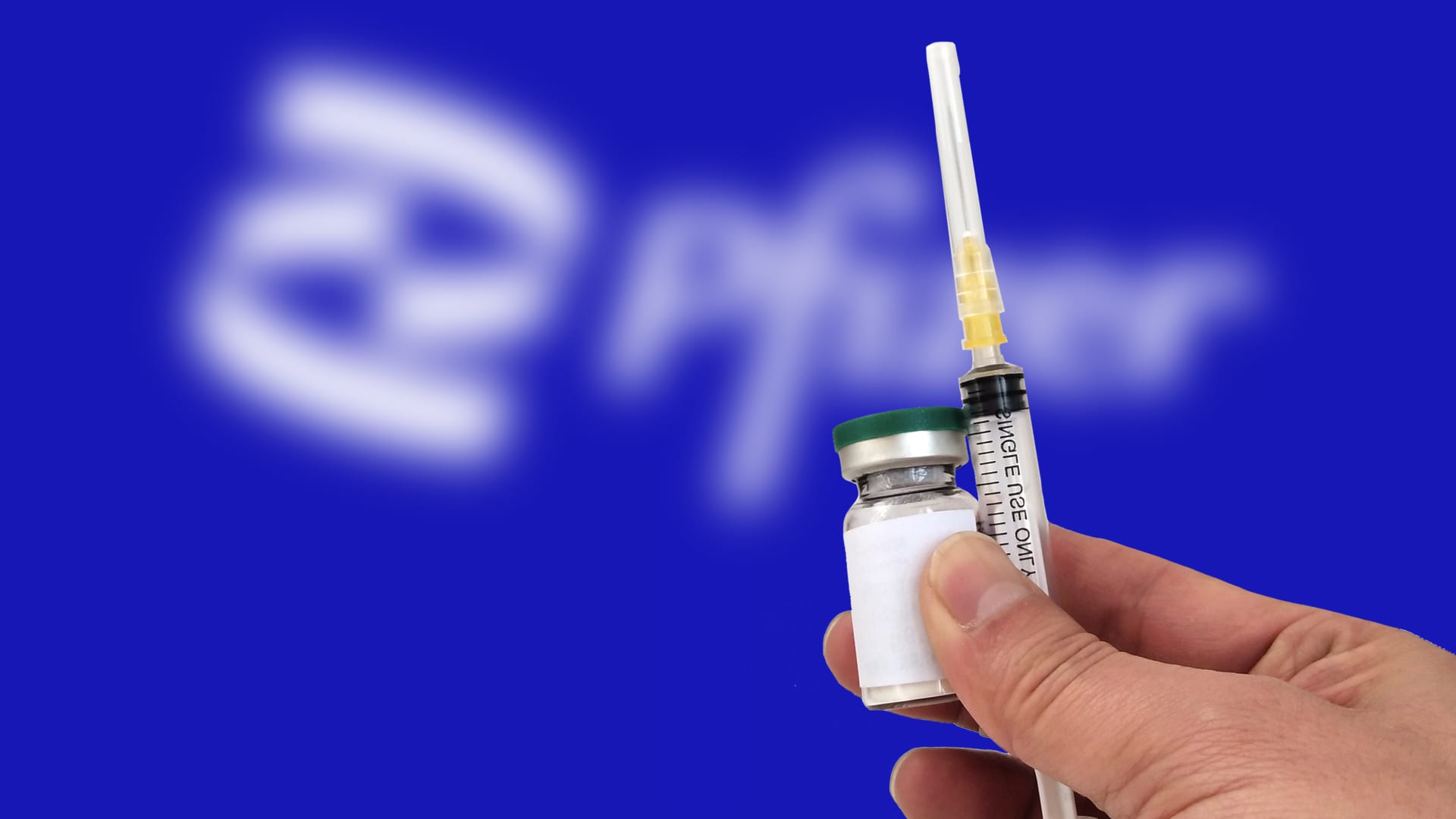Pfizer on Tuesday reported a narrower than expected adjusted loss for the third quarter as the drugmaker recorded charges largely related to struggles for its Covid antiviral treatment Paxlovid and Covid vaccine.
Pfizer said that it recorded a $5.6 billion charge for inventory write-offs in the third quarter due to lower-than-expected use of Covid products. Of these write-offs, $4.7 billion are chalked up to Paxlovid and $900 million are attributed to the company’s company vaccine.
The pharmaceutical giant also reiterated the full-year adjusted earnings and revenue guidance it announced two weeks ago, which is drastically lower than its initial projections due to weakening demand for its Covid products. That decline in demand also led Pfizer to announce a sweeping $3.5 billion cost-cutting plan at the same time.
Those efforts were seen as necessary to shore up investor sentiment as Pfizer and its rivals like Moderna struggle to navigate the rapid decline of their Covid businesses, which are transitioning to the commercial market in the U.S. this year.
Here’s what Pfizer reported for the third quarter compared with what Wall Street was expecting, based on a survey of analysts by LSEG, formerly known as Refinitiv:
- Loss per share: 17 cents adjusted vs. 34 cents expected
- Revenue: $ 13.23 billion vs. $13.34 billion expected
Pfizer reported third-quarter revenue of $13.23 billion, down 42% from the same period a year ago, due to the decline in sales of its Covid products.
The company’s Covid vaccine raked in $1.31 billion in sales, down 70% from the year-ago quarter. Analysts had expected the shot to bring in $1.53 billion in sales, according to FactSet estimates.
Paxlovid posted $202 million in revenue, a drop of 97%. Analysts had expected $613.5 million in sales of the drug, according to FactSet estimates.
Together, the products pulled in around $1.5 billion in revenue for the quarter. That compares with roughly $12 billion in sales during the same period a year ago.
For the third quarter, Pfizer booked a net loss of $2.38 billion, or 42 cents per share. That compares to a net income $8.61 billion, or $1.51 per share, during the same period a year ago.
Excluding certain items, the company’s earnings per share were 17 cents for the quarter.
Pfizer reiterated the guidance it outlined in October: The company expects 2023 sales of $58 billion to $61 billion and full-year adjusted earnings of $1.45 to $1.65 per share.
The company anticipates that its Covid vaccine will rake in $11.5 billion in sales this year.
Meanwhile, the pharmaceutical giant expects its Covid antiviral treatment Paxlovid to bring in $1 billion in revenue. Pfizer has agreed to take 8 million Paxlovid courses back early from the U.S. government, which is part of an effort to get more higher-priced sales of the drug on the commercial market.
Shares of Pfizer are down roughly 40% for the year through Monday’s close, putting the company’s market value at around $172.5 billion.
Pfizer’s non-Covid drugs
Excluding Covid products, Pfizer said revenue for the quarter grew 10% operationally.
The company said that growth was partly fueled by its new vaccine against respiratory syncytial virus, which entered the market during the quarter for seniors and expectant mothers. The shot, known as Abrysvo, posted $375 million in sales for the period.
Recently acquired drugs also drove revenue. Biohaven Pharmaceuticals’ migraine drug Nurtec ODT and Global Blood Therapeutics’ sickle cell disease treatment Oxbryta drew in $233 million and $85 million, respectively.
The company said revenue was also fueled by strong sales of Vyndaqel drugs, which are used to treat a certain type of cardiomyopathy, a disease of the heart muscle. Those drugs booked $892 million in sales, up 48% from the third quarter of 2022.
A group of shots to protect against pneumococcal pneumonia also contributed, raking in $1.85 billion in sales for the quarter, up 15% from the year-ago period.
Meanwhile, Pfizer’s blood-thinner Eliquis posted $1.49 billion in revenue for the third quarter, up just 2% from a year ago. That came in slightly under analysts’ estimates of $1.54 billion, according to FactSet.
Eliquis, which is marketed in partnership with Bristol Myers Squibb, is among the first ten drugs to face Medicare drug price negotiations.
Wells Fargo analyst Mohit Bansal said in a research note Tuesday that the operational revenue growth during the quarter “bodes well” for Pfizer to meet its full-year guidance of 6% to 8% growth compared to 2022.
Pfizer drug pipeline, M&A
Pfizer is hoping to shift investor focus away from Covid toward its growth opportunities, including mergers and acquisitions and a record pipeline.
The company had a busy few months of product launches, which included a vaccine for respiratory syncytial virus, an ulcerative colitis pill, a meningococcal vaccine and of course, the newest version of its Covid vaccine.
Investors are waiting for updates on a mid-stage trial of Pfizer’s oral obesity pill danuglipron, which could potentially compete with Eli Lilly‘s experimental obesity pill orforglipron. Positive data could solidify Pfizer as a viable competitor in the weight loss drug space, which Novo Nordisk and Eli Lilly have so far dominated.
Investors are also looking for any updates on Pfizer’s $43 billion acquisition of cancer therapy maker Seagen, a deal the company believes could contribute more than $10 billion in risk-adjusted sales by 2030.
The European Commission, the executive body of the European Union, approved the proposed buyout earlier this month.
Pfizer will hold an earnings call with investors at 10 a.m. ET.
